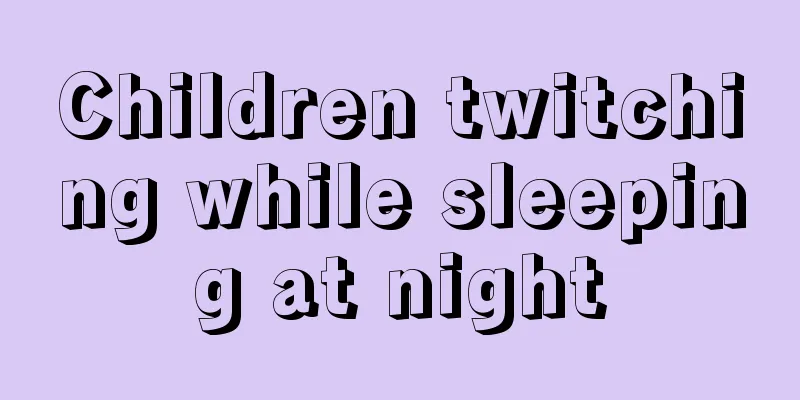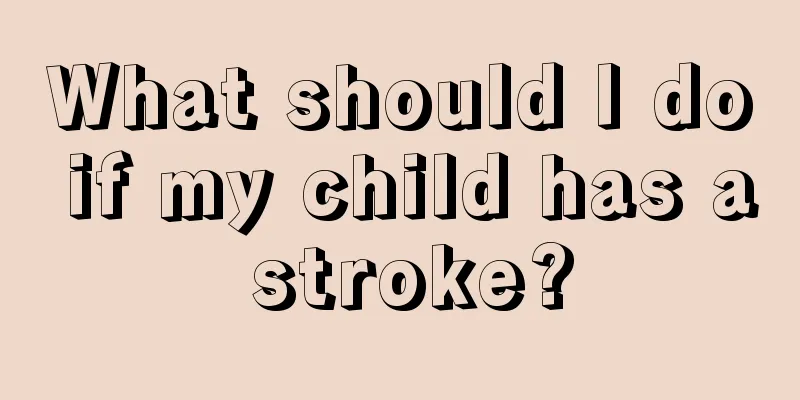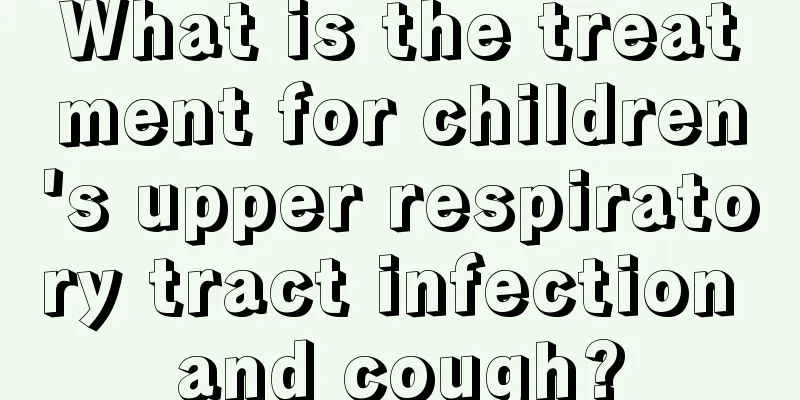Children twitching while sleeping at night

|
When the child was sleeping at night, the parents found that every part of the child's body would twitch. Many parents think that it is a problem of sleeping posture, but after adjusting the sleeping posture, the child’s convulsions do not improve. Why is this? When a child experiences severe convulsions in local or whole-body muscles, parents must take the child to the hospital for testing to avoid worsening of the condition. Pediatric convulsions refer to involuntary, paroxysmal and strong contractions of the whole or local muscles of a child. The seizures can be tonic (continuous muscle contraction), clonic (intermittent muscle contraction) and mixed (sequential occurrence of tonic and clonic contractions). Fever, dehydration, hypoglycemia, brain lesions, trauma, and tumors may all cause convulsions, among which febrile convulsions have the highest incidence rate. Causes of convulsions A convulsion is an involuntary, paroxysmal, strong contraction of the whole or local muscles. The seizure can be tonic (continuous muscle contraction), clonic (intermittent muscle contraction), and mixed (sequential tonic and clonic contractions). Convulsion-related diseases: hypocalcemia and hypomagnesemia, convulsions, epilepsy. High fever, epilepsy, tetanus, rabies, calcium deficiency, etc. can all cause convulsions, which are systemic. There are also local ones, such as gastrocnemius (commonly known as calf) spasms, which are often caused by rapid exercise, work fatigue, or severe twisting of the tibia, and often occur when lying down or sleeping. Symptoms of convulsions 1. Generalized tonic convulsions: The muscles of the whole body are rigid and twitching in waves, showing opisthotonos (the head is tilted back and the whole body is bent backward in a bow shape), the eyes are rolled up or staring, and the patient is unconscious. 2. Localized convulsions: only local muscles twitch, such as twitching of only one side of the limbs, or twitching of facial muscles, or twitching of fingers or toes, or eye movements, nystagmus, blinking, staring, etc. Most are unconscious. The above convulsions can last for a few seconds or several minutes, and in severe cases can last for several minutes or recur repeatedly. Convulsions lasting more than 30 minutes are called persistent state convulsions. 3. Febrile convulsions: mainly seen in children aged 6 months to 4 years who have convulsions when they have high fever. High fever convulsions are short-lived, and consciousness recovers quickly after the convulsion. They often occur in the early stages of a fever. During a fever, there is often only one convulsion. Brain diseases and other serious illnesses can be ruled out, and an EEG will be normal one week after the fever subsides. Prevention of convulsions Prevention is achieved by actively treating the primary disease according to its cause. For example, epileptic patients need to take medication as prescribed by the doctor. If they suddenly stop taking the medication, even for 1 to 2 days, it will cause epileptic convulsions. For example, children with high fever are prone to convulsions, and timely fever reduction can prevent convulsions. Tetanus can cause convulsions, so tetanus vaccine should be given to prevent tetanus. Rabies can cause convulsions, so it is important to prevent dog bites. If you are bitten by a dog, go to the hospital for treatment immediately. Calcium deficiency can cause convulsions, so children need to supplement calcium (eat more calcium-containing foods, take calcium gluconate, calcium tablets, etc. when necessary), and also get more sun exposure, take cod liver oil, etc. To prevent gastrocnemius cramps, do adequate warm-up exercises before strenuous exercise or swimming. To prevent cramps in this area when sleeping at night, avoid over-tiredness during the day and avoid exposing your legs to cold at night. |
<<: What happens if a child ejaculates?
>>: What to do if your child has eye pain
Recommend
What causes itchy head in children?
Itchy scalp in children is a problem that many pa...
What to do if your child has eczema
Some children have weak constitutions and if they...
Symptoms and care of neonatal eczema
Neonatal eczema is a relatively common disease. I...
Seven-month-old baby fell on the back of his head
In life, if we adults accidentally fall on the ba...
Newborn baby care methods
After the baby is born, many parents, as they are...
What do two and a half year old babies need to supplement?
Nutritional intake in early childhood is very imp...
Disadvantages of the second generation of test tube babies
For infertile men, IVF is undoubtedly the best so...
What is the reaction of a child who is allergic to penicillin?
Penicillin is a type of antibiotic. Penicillin it...
Is it good for children to drink milk on an empty stomach in the morning?
We all have the habit of drinking milk. We all kn...
What to do if your baby has a fever and difficulty breathing
It is winter and the weather is quite cold. Many ...
Can nine-month-old babies eat winter melon?
If a nine-month-old baby has no gastrointestinal ...
What is the reason for my baby’s low fever?
Fever means that a person's body temperature ...
What to do if your child has high blood pressure
High blood pressure is a very common disease. Thi...
Why do children’s nails turn white? Young mothers must watch
The symptom of white nails may also occur in chil...
How old is the baby when all the teeth grow
Many parents hope that their baby's teeth can...









